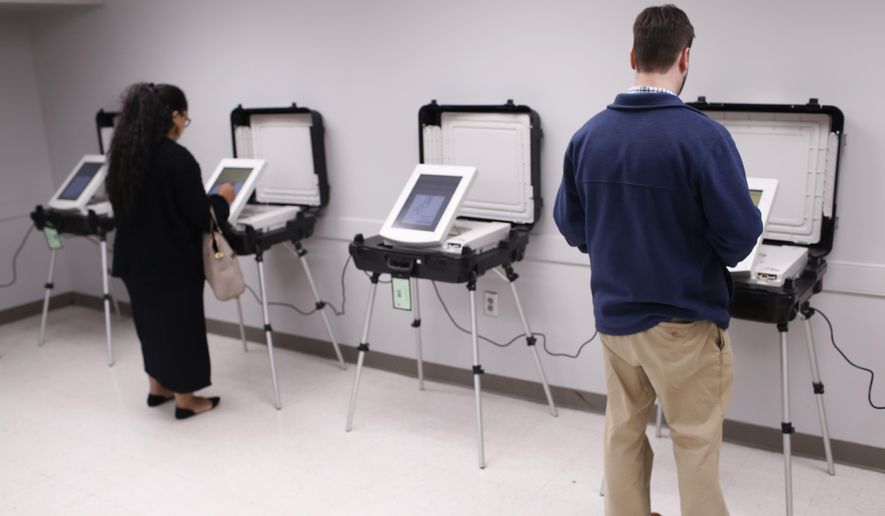A federal judge ruled Thursday that Georgia’s electronic voting system is defective, vulnerable to a foreign government’s hacking, and cannot be used in the 2020 elections.
Judge Amy Totenberg, an Obama appointee to the Northern District of Georgia, ordered the state to stop using its current electronic voting machines by next year’s primaries and demanded officials clean up voter registration databases to ensure eligible voters aren’t shut out of casting ballots.
Georgia was already moving to replace its old system, but the judge’s ruling says it cannot keep the old methods around as a backup should the state fail to transition fast enough.
The ruling also marks the deepest the federal judiciary has delved into trying to shore up American elections systems in the wake of Russia’s efforts to interfere in the 2016 campaign.
“Georgia’s current voting equipment, software, election and voter databases, are antiquated, seriously flawed, and vulnerable to failure, breach, contamination, and attack,” Judge Totenberg wrote in her 153-page ruling.
The decision is an embarrassment for Georgia Gov. Brian Kemp, formerly the secretary of state, who won the gubernatorial race last year amid intense scrutiny of his oversight of the state’s election practices.
While there’s no evidence the state’s systems have been compromised, reports of voters struggling to cast ballots drew national attention. Mr. Kemp’s Democratic opponent, Stacey Abrams, refused to concede, claiming votes were suppressed.
Judge Totenberg recounted some of those problems in her lengthy ruling, pointing to a number of voters who said they tried to cast ballots for Ms. Abrams but their machines instead seemed to register votes for Mr. Kemp.
Two voters said it took them three attempts to change the screen before it showed them backing Ms. Abrams. Other voters said their ballots were missing some races, and still others said they were sent to the wrong precincts by the state’s system.
The judge ordered Georgia to write a plan by early next year for cleaning up its voter registration database and providing better guidance for how election officials should accept provisional ballots.
Mr. Kemp had signed legislation this year setting a path for new elections systems, and Judge Totenberg acknowledged that move in her ruling.
But she suggested progress was iffy.
To prevent the state from falling back on the old system as a failsafe, she ordered that it cannot be used beyond this year.
The Lawyers’ Committee for Civil Rights Under Law, which was part of the challenge to Georgia’s practices, called it a monumental decision in the broader fight over American voting.
“Protecting electoral integrity and protecting the right to vote are one and the same. We hope that this historic decision sends a strong message to other states with similarly outdated and hackable equipment that they must take action now to modernize and update their systems in advance of the 2020 election cycle,” said Kristen Clarke, president of the Lawyers’ Committee.
American voting practices have been in upheaval over the last 20 years.
The push toward electronic devices grew after the 2000 election, when the outcome hung on questionable votes cast on paper ballots in Florida.
But after U.S. intelligence agencies described Russian efforts to hack the 2016 election, experts said having a paper trail is critical to preventing meddling in the vote tally.
• Stephen Dinan can be reached at sdinan@washingtontimes.com.




Please read our comment policy before commenting.